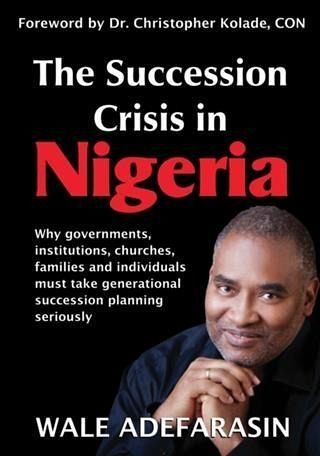
Succession Crisis in Nigeria (eBook, ePUB)

PAYBACK Punkte
8 °P sammeln!
The Succession Crisis in Nigeria is one of the most important books you will ever read on generational succession planning. It zeroes in on Nigeria and identifies the failure in establishing generational succession planning as one of the most critical problems facing fathers, business leaders, corporate leaders, community leaders, government leaders and church leaders in the country. It also explains the benefits of raising successors with the right kind of values and why a generational perspective is vital when considering succession planning. For many Nigerians who have been alive since befo...
The Succession Crisis in Nigeria is one of the most important books you will ever read on generational succession planning. It zeroes in on Nigeria and identifies the failure in establishing generational succession planning as one of the most critical problems facing fathers, business leaders, corporate leaders, community leaders, government leaders and church leaders in the country. It also explains the benefits of raising successors with the right kind of values and why a generational perspective is vital when considering succession planning. For many Nigerians who have been alive since before the nation's independence in 1960, the half century between then and now may truly be called 'The Era of the Decline of Institutions'. It is difficult to find one important institution in the country that has not lost a discernible part of its quality and value in the period. Equally, it is becoming impossible to find a community anywhere in Nigeria in which societal values have survived undamaged. Indeed, Wale Adefarasin is convinced that "the core of our national malaise in Nigeria is a catastrophic loss of values." From this, we may be tempted to draw the simple conclusion, either that past generations of Nigerians have not added much value to their country, or, at least, that they have not - in the words of Scripture - been able to bear "fruit that will last." [John 15:16] Yet we know that we would be hugely mistaken to come to such a conclusion. We are able to recall the names of many Nigerians of excellence who have passed through our land, people who qualify to be described as people of excellence precisely because they brought great glory to their country on account of the nobility and loftiness of their value contribution both at home and internationally. This book reflects the agitation in the mind of the author as he sees that much of that excellent quality has withered away, leaving behind a society that now looks a shadow of itself. We often pray for our friends that their "shadow may never grow less"; but as the substance of the Nigerian persona has diminished, so has its 'shadow' suffered progressive diminution! It has been said that, "leaders are tenants of time and context". If previous generations added good value in their own time, can we then justifiably lay the blame at the door of their successor generations for failing to maintain and improve that which they inherited? Wale Adefarasin's thesis is that our real problem is that we have been very poor at managing succession from one generation to the next, not just in terms of passing on responsibility, but particularly in effectively transferring values and standards across generations. Today, businesses have come to acknowledge the wisdom of managing succession, not only between today's job-holder and his immediate successor, but at multiple levels, as deep into the organisation as is practicable. Current events and trends suggest that we have, in fact, a crisis of succession in Nigeria. Pastor Wale Adefarasin has shown much courage and determination in sharing his thoughts and concerns at a time like this. This is completely understandable when we remember the eminence of his pedigree as well as the consistency with which he has pursued his chosen calling and responsibility for capacity building as a pastor. He is a successful practitioner who continues to demonstrate the certainty of achievement in anything to which we truly give our heart. He reminds one constantly that Apostle Paul did not over-state his injunction - "Whatever you do, work at it with all your heart, as working for the Lord, not for men." [Colossians 3:23] These attributes confirm the certainty that those who read this book will find much of real benefit in doing so, and thereby, come closer to the possibility that, indeed, we may all leave this nation, Nigeria, in a better state than that in which we found her. - Dr.
Dieser Download kann aus rechtlichen Gründen nur mit Rechnungsadresse in A, B, BG, CY, CZ, D, DK, EW, E, FIN, F, GR, HR, H, IRL, I, LT, L, LR, M, NL, PL, P, R, S, SLO, SK ausgeliefert werden.












